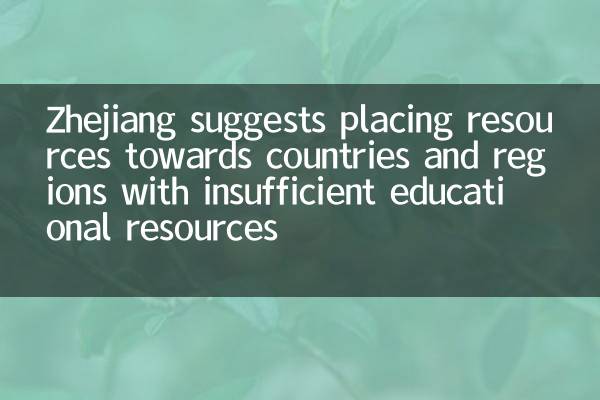Zhejiang suggests placing resources towards countries and regions with insufficient educational resources
In recent years, the problem of uneven global allocation of educational resources has become increasingly prominent, and developing countries and regions generally face the dilemma of shortage of educational resources. As a strong education province in China, Zhejiang Province recently put forward a suggestion with an international perspective: to tilt resources towards countries and regions with insufficient educational resources to help global educational equity. This proposal quickly became a hot topic on the Internet, demonstrating Zhejiang's responsibility in promoting the internationalization of education.
The following are hot statistics on educational resources discussions across the Internet in the past 10 days:

| Ranking | Hot Topics | Discussion volume (10,000) | Mainly involved in the region |
|---|---|---|---|
| 1 | Zhejiang suggests giving priority to educational resources | 125.6 | worldwide |
| 2 | Current status of education gap in Africa | 98.3 | Sub-Saharan Africa |
| 3 | China's education aid results | 76.2 | Southeast Asia, Africa |
| 4 | Online education technology application | 65.8 | worldwide |
| 5 | Education Equity Index Ranking | 54.1 | OECD Country |
Specific contents of Zhejiang's suggestions
The Zhejiang Provincial Department of Education clearly pointed out in its proposal that insufficient educational resources are one of the key issues hindering global sustainable development. The proposal includes three main aspects:
1.Educational resource sharing: Provide high-quality course resources to developing countries through digital platforms;
2.Teacher Training Program: Training teachers in areas with scarce educational resources to improve teaching quality;
3.Infrastructure Assistance: Participate in school construction and improve basic teaching conditions.
According to UNESCO, the current status of global educational resources is worrying:
| area | Elementary school enrollment rate | High school enrollment rate | Teacher-student comparison |
|---|---|---|---|
| Sub-Saharan Africa | 78% | 42% | 1:43 |
| South Asia | 92% | 68% | 1:37 |
| Latin America | 95% | 76% | 1:25 |
| East Asia and the Pacific | 97% | 83% | 1:21 |
Response from the international community
This initiative in Zhejiang has received a positive response from international education organizations. The director of the UNESCO Regional Office for East Asia said: "This proposal is highly consistent with the concept of educational equity in the United Nations Sustainable Development Goals." At the same time, the education sectors in many African countries have also expressed their willingness to cooperate.
It is worth noting that China has achieved remarkable results in international education aid in recent years:
| years | Number of schools aided | Number of teachers trained | Covering the country |
|---|---|---|---|
| 2020 | 57 | 2,450 | twenty four |
| 2021 | 63 | 3,120 | 28 |
| 2022 | 71 | 3,850 | 32 |
Future Outlook
Experts pointed out that Zhejiang's proposal not only reflects the responsibility of a major country in China's local government, but also provides an actionable solution to solve the problem of global education imbalance. With the popularization of digital technology, the promotion of new models such as distance education and AI-assisted teaching will provide more possibilities for resource tilt.
Education is an important force in changing individual destiny and promoting social progress. Zhejiang's initiative is expected to drive more regions and institutions to pay attention to the issue of global educational equity and jointly build a community with a shared future for mankind. As UN Secretary-General Guterres said, "Education is at the heart of the 2030 Agenda for Sustainable Development and the basis for achieving all other Sustainable Development Goals."
It can be foreseen that with the joint efforts of all parties around the world, the problem of uneven allocation of educational resources will gradually improve, so that every child can enjoy fair and quality education.

check the details

check the details